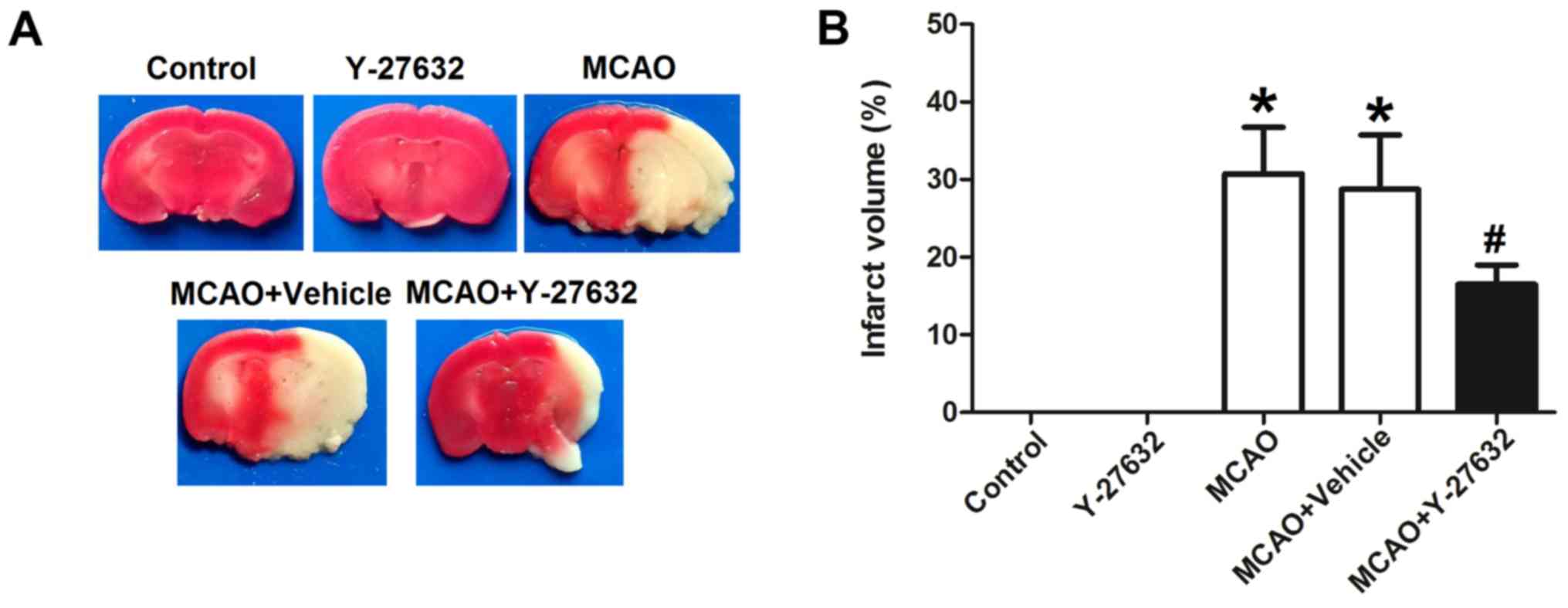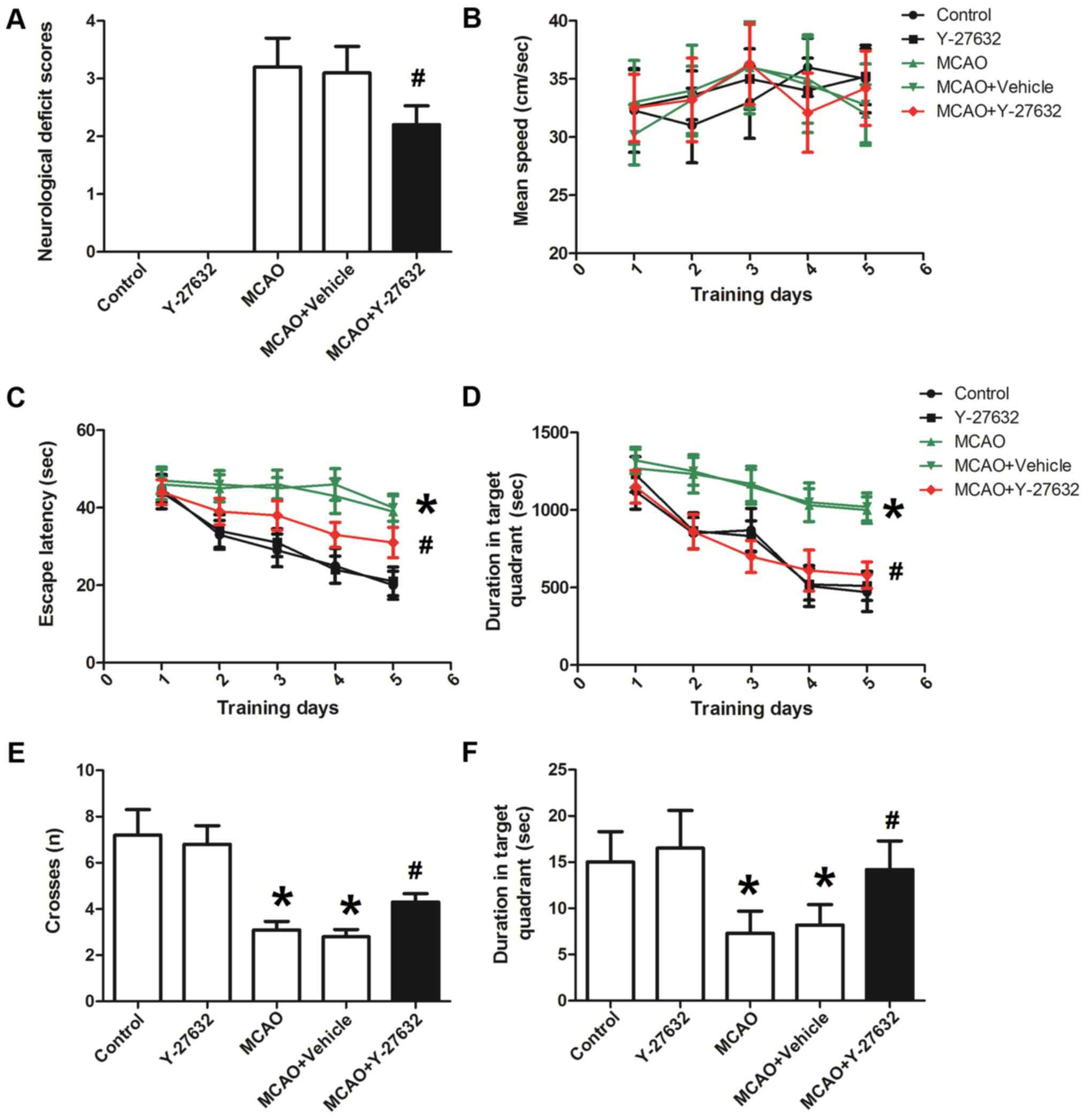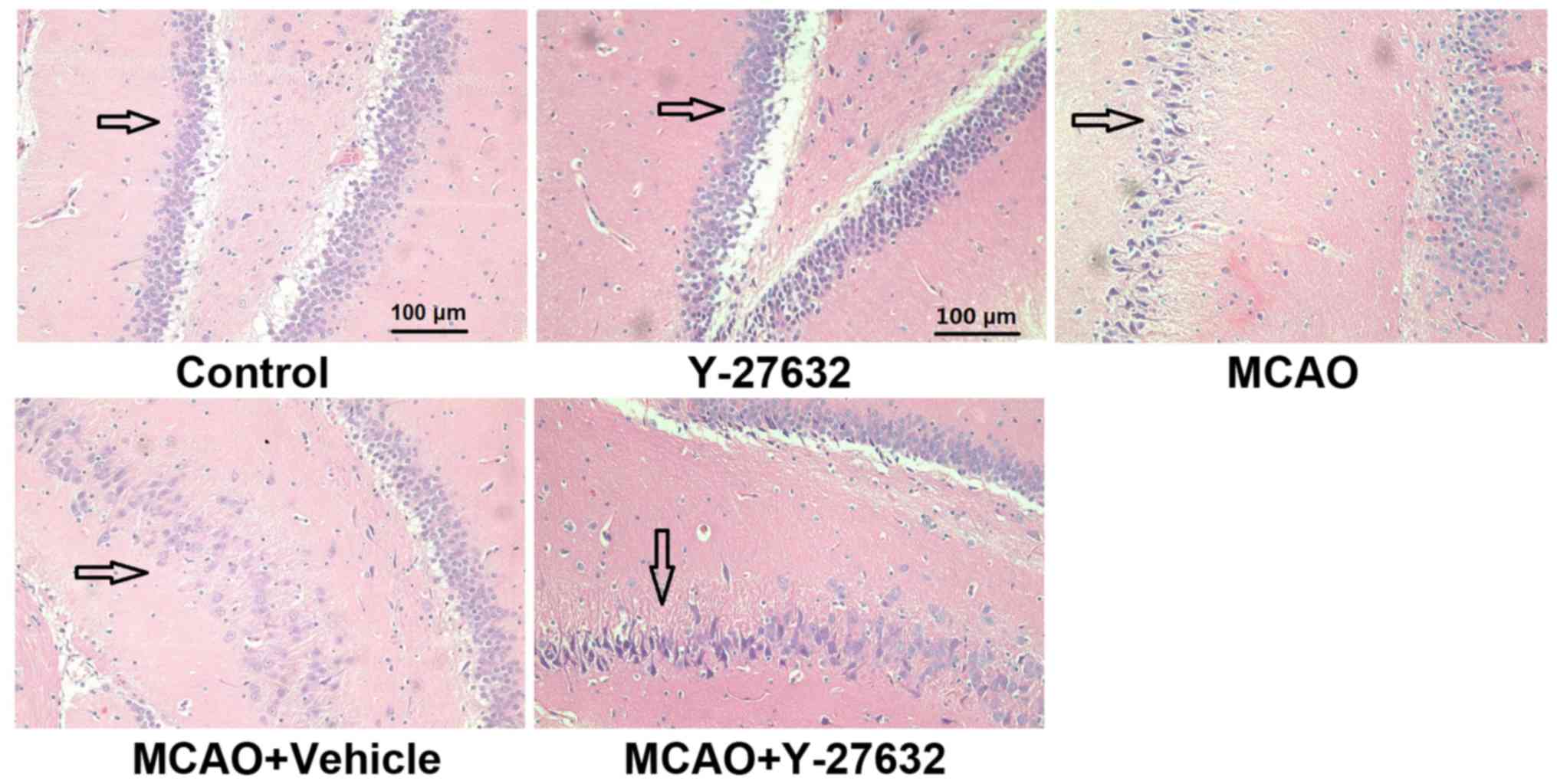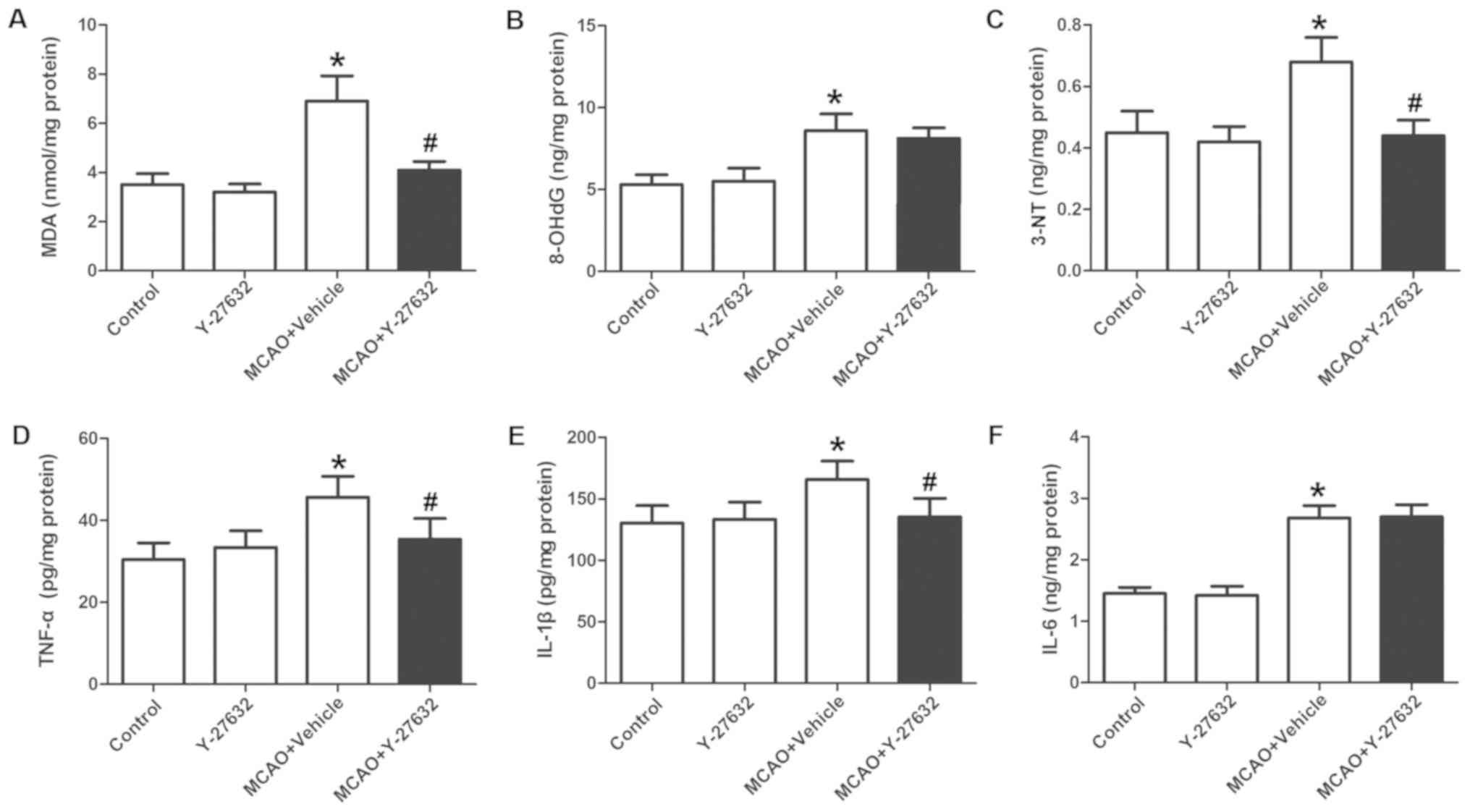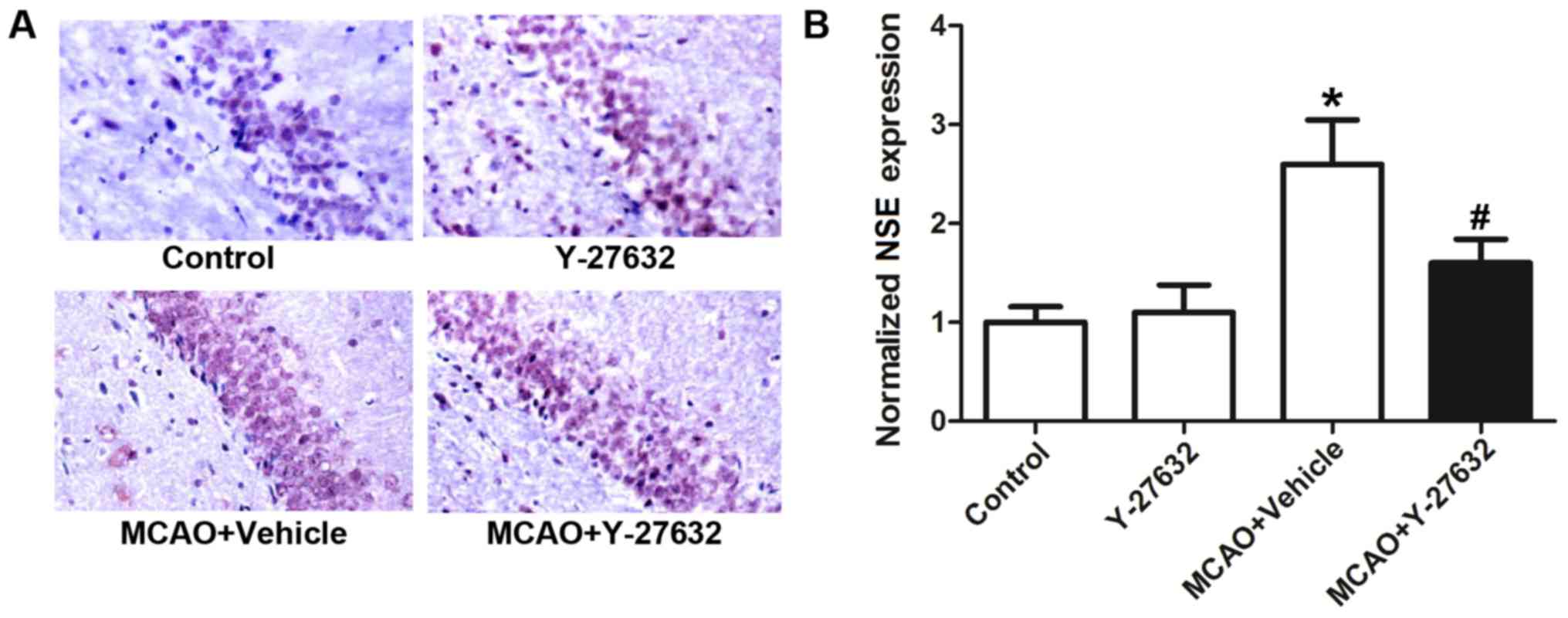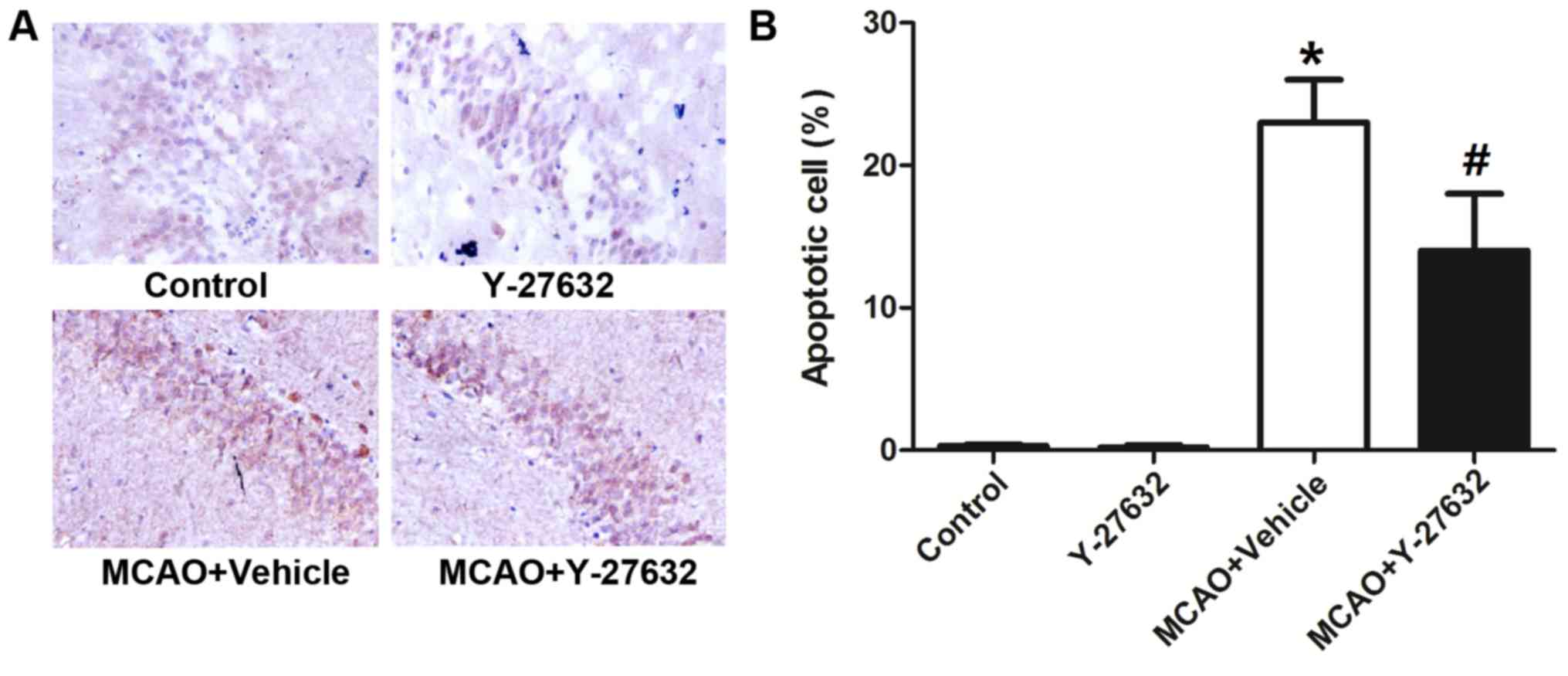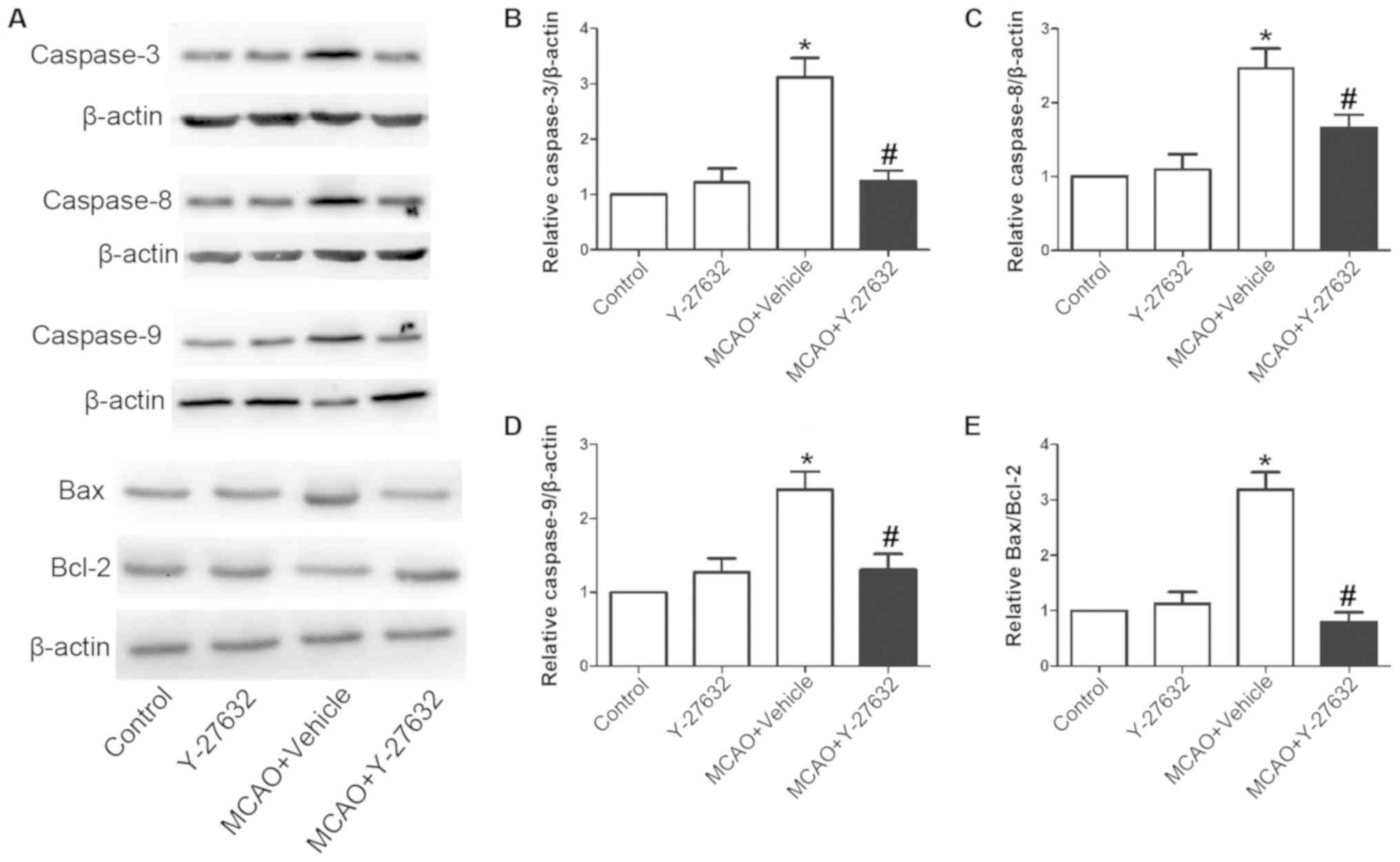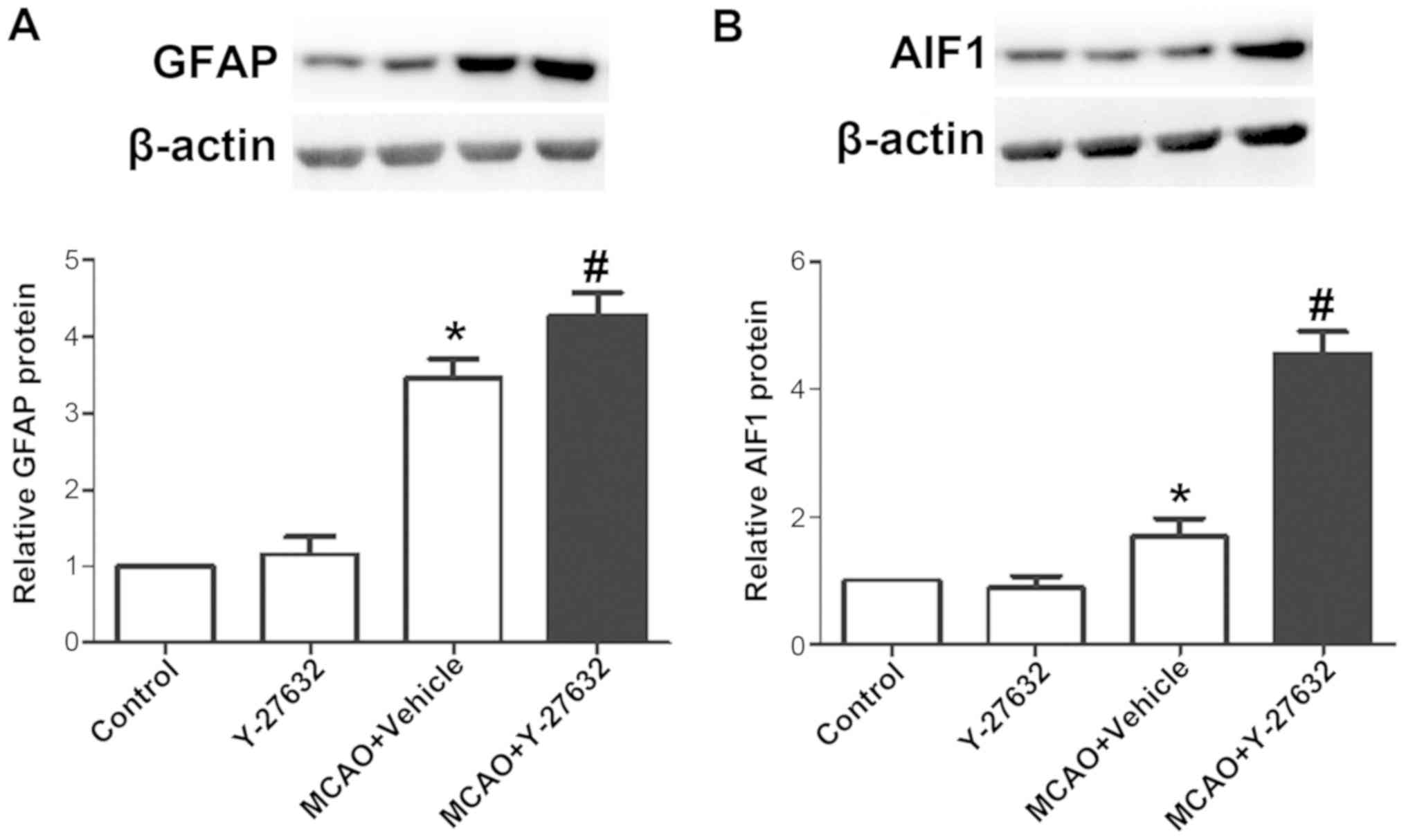|
1
|
Iadecola C and Anrather J: Stroke research
at a crossroad: Asking the brain for directions. Nat Neurosci.
14:1363–1368. 2011. View
Article : Google Scholar : PubMed/NCBI
|
|
2
|
Breuer L, Knott M, Struffert T, Kloska S,
Kurka N, Schwab S, Dörfler A, Köhrmann M and Engelhorn T: Limited
versus whole-brain perfusion for the indication of thrombolysis in
the extended time window of acute cerebral ischemia. J Stroke
Cerebrovasc Dis. 24:2491–2496. 2015. View Article : Google Scholar : PubMed/NCBI
|
|
3
|
Xiong XY, Liu L and Yang QW: Refocusing
neuroprotection in cerebral reperfusion era: New challenges and
strategies. Front Neurol. 9:2492018. View Article : Google Scholar : PubMed/NCBI
|
|
4
|
Panieri E, Gogvadze V, Norberg E,
Venkatesh R, Orrenius S and Zhivotovsky B: Reactive oxygen species
generated in different compartments induce cell death, survival, or
senescence. Free Radic Biol Med. 57:176–187. 2013. View Article : Google Scholar : PubMed/NCBI
|
|
5
|
Xue J, Zhang X, Zhang C, Kang N, Liu X, Yu
J, Zhang N, Wang H, Zhang L, Chen R, et al: Protective effect of
Naoxintong against cerebral ischemia reperfusion injury in mice. J
Ethnopharmacol. 182:181–189. 2016. View Article : Google Scholar : PubMed/NCBI
|
|
6
|
Julian L and Olson MF: Rho-associated
coiled-coil containing kinases (ROCK): Structure, regulation, and
functions. Small GTPases. 5:e298462014. View Article : Google Scholar : PubMed/NCBI
|
|
7
|
Schmandke A, Schmandke A and Strittmatter
SM: ROCK and Rho: Biochemistry and neuronal functions of
Rho-associated protein kinases. Neuroscientist. 13:454–469. 2007.
View Article : Google Scholar : PubMed/NCBI
|
|
8
|
Gong H and Yang CY: Morphological and
hydrodynamic correlations with increasing outflow facility by
rho-kinase inhibitor Y-27632. J Ocul Pharmacol Ther. 30:143–153.
2014. View Article : Google Scholar : PubMed/NCBI
|
|
9
|
Oda T, Kume T, Izumi Y, Ishihara K,
Sugmimoto H and Akaike A: Na+/Ca2+ exchanger
inhibitors inhibit neurite outgrowth in PC12 cells. J Pharmacol
Sci. 116:128–131. 2011. View Article : Google Scholar : PubMed/NCBI
|
|
10
|
Wang J, Li H, Yao Y, Ren Y, Lin J, Hu J,
Zheng M, Song X, Zhao T, Chen YY, et al: β-elemene enhances GAP-43
expression and neurite outgrowth by inhibiting RhoA kinase
activation in rats with spinal cord injury. Neuroscience.
383:12–21. 2018. View Article : Google Scholar : PubMed/NCBI
|
|
11
|
Pang Y, Chai CR, Gao K, Jia XH, Kong JG,
Chen XQ, Vatcher G, Chen JG and Yu AC: Ischemia preconditioning
protects astrocytes from ischemic injury through 14-3-3γ. J
Neurosci Res. 93:1507–1518. 2015. View Article : Google Scholar : PubMed/NCBI
|
|
12
|
Zhao JJ, Hu JX, Lu DX, Ji CX, Qi Y, Liu
XY, Sun FY, Huang F, Xu P and Chen XH: Soluble cpg15 from
astrocytes ameliorates neurite outgrowth recovery of hippocampal
neurons after mouse cerebral ischemia. J Neurosci. 37:1628–1647.
2017. View Article : Google Scholar : PubMed/NCBI
|
|
13
|
Yang C, Zhang X, Fan H and Liu Y: Curcumin
upregulates transcription factor Nrf2, HO-1 expression and protects
rat brains against focal ischemia. Brain Res. 28:133–141. 2009.
View Article : Google Scholar
|
|
14
|
Jia D, Deng Y, Gao J, Liu X, Chu J and Shu
Y: Neuroprotective effect of Panax notoginseng plysaccharides
against focal cerebral ischemia reperfusion injury in rats. Int J
Biol Macromol. 63:177–180. 2014. View Article : Google Scholar : PubMed/NCBI
|
|
15
|
Ahmadi M, Rajaei Z, Hadjzadeh MA, Nemati H
and Hosseini M: Crocin improves spatial learning and memory
deficits in the Morris water maze via attenuating cortical
oxidative damage in diabetic rats. Neurosci Lett. 642:1–6. 2017.
View Article : Google Scholar : PubMed/NCBI
|
|
16
|
Mueller BK, Mack H and Teusch N: Rho
kinase, a promising drug target for neurological disorders. Nat Rev
Drug Discov. 4:387–398. 2005. View
Article : Google Scholar : PubMed/NCBI
|
|
17
|
Tanaka T, Nishimura D, Wu RC, Amano M, Iso
T, Kedes L, Nishida H, Kaibuchi K and Hamamori Y: Nuclear Rho
kinase, ROCK2, targets p300 acetyltransferase. J Biol Chem.
281:15320–15329. 2006. View Article : Google Scholar : PubMed/NCBI
|
|
18
|
Wen JY, Gao SS, Chen FL, Chen S, Wang M
and Chen ZW: Role of CSE-produced H2S on cerebrovascular relaxation
via RhoA-ROCK inhibition and cerebral ischemia-reperfusion injury
in Mice. ACS Chem Neurosci. 10:1565–1574. 2019. View Article : Google Scholar : PubMed/NCBI
|
|
19
|
Sun XQ, Chen S, Wang LF and Chen ZW: Total
flavones of Rhododendron simsii Planch flower protect isolated rat
heart from ischaemia-reperfusion injury and its mechanism of
UTR-RhoA-ROCK pathway inhibition. J Pharm Pharmacol. 70:1713–1722.
2018. View Article : Google Scholar : PubMed/NCBI
|
|
20
|
Chen F, Liu Z, Peng W, Gao Z, Ouyang H,
Yan T, Ding S, Cai Z, Zhao B, Mao L and Cao Z: Activation of EphA4
induced by EphrinA1 exacerbates disruption of the blood-brain
barrier following cerebral ischemia-reperfusion via the Rho/ROCK
signaling pathway. Exp Ther Med. 16:2651–2658. 2018.PubMed/NCBI
|
|
21
|
Yada T, Shimokawa H, Hiramatsu O, Kajita
T, Shigeto F, Tanaka E, Shinozaki Y, Mori H, Kiyooka T, Katsura M,
et al: Beneficial effect of hydroxyfasudil, a specific Rho-kinase
inhibitor, on ischemia/reperfusion injury in canine coronary
microcirculation in vivo. J Am Coll Cardiol. 45:599–607. 2005.
View Article : Google Scholar : PubMed/NCBI
|
|
22
|
Hamid SA, Bower HS and Baxter GF: Rho
kinase activation plays a major role as a mediator of irreversible
injury in reperfused myocardium. Am J Physiol Heart Circ Physiol.
292:H2598–H2606. 2007. View Article : Google Scholar : PubMed/NCBI
|
|
23
|
Shin HK, Salomone S, Potts EM, Lee SW,
Millican E, Noma K, Huang PL, Boas DA, Liao JK, Moskowitz MA and
Ayata C: Rho-kinase inhibition acutely augments blood flow in focal
cerebral ischemia via endothelial mechanisms. J Cereb Blood Flow
Metab. 27:998–1009. 2007. View Article : Google Scholar : PubMed/NCBI
|
|
24
|
Tiftik RN, Baskurt OK, Kul S and
Buyukafsar K: The functional significance of the rho/rho-kinase
pathway in human erythrocytes. Turk J Haematol. 31:168–174. 2014.
View Article : Google Scholar : PubMed/NCBI
|
|
25
|
Iwasaki H, Okamoto R, Kato S, Konishi K,
Mizutani H, Yamada N, Isaka N, Nakano T and Ito M: High glucose
induces plasminogen activator inhibitor-1 expression through
Rho/Rho-kinase-mediated NF-kappaB activation in bovine aortic
endothelial cells. Atherosclerosis. 196:22–28. 2008. View Article : Google Scholar : PubMed/NCBI
|
|
26
|
Shen L, Black ED, Witkowski ED, Lencer WI,
Guerriero V, Schneeberger EE and Turner JR: Myosin light chain
phosphorylation regulates barrier function by remodeling tight
junction structure. J Cell Sci. 119:2095–2106. 2006. View Article : Google Scholar : PubMed/NCBI
|
|
27
|
Satoh S, Utsunomiya T, Tsurui K, Kobayashi
T, Ikegaki I, Sasaki Y and Asano T: Pharmacological profile of
hydroxy fasudil as a selective rho kinase inhibitor on ischemic
brain damage. Life Sci. 69:1441–1453. 2001. View Article : Google Scholar : PubMed/NCBI
|
|
28
|
Rikitake Y, Kim HH, Huang Z, Seto M, Yano
K, Asano T, Moskowitz MA and Liao JK: Inhibition of Rho kinase
(ROCK) leads to increased cerebral blood flow and stroke
protection. Stroke. 36:2251–2257. 2005. View Article : Google Scholar : PubMed/NCBI
|
|
29
|
Lu Z, Cheng D, Yin J, Wu R, Zhang G, Zhao
Q, Wang N, Wang F and Liang M: Antithrombin III protects against
contrast-induced nephropathy. EBioMedicine. 17:101–107. 2017.
View Article : Google Scholar : PubMed/NCBI
|
|
30
|
Yin J, Wang F, Kong Y, Wu R, Zhang G, Wang
N, Wang L, Lu Z and Liang M: Antithrombin III prevents progression
of chronic kidney disease following experimental
ischaemic-reperfusion injury. J Cell Mol Med. 21:3506–3514. 2017.
View Article : Google Scholar : PubMed/NCBI
|
|
31
|
Chandra S, Romero MJ, Shatanawi A,
Alkilany AM, Caldwell RB and Caldwell RW: Oxidative species
increase arginase activity in endothelial cells through the
RhoA/Rho kinase pathway. Br J Pharmacol. 165:506–519. 2012.
View Article : Google Scholar : PubMed/NCBI
|
|
32
|
Kahles T, Luedike P, Endres M, Galla HJ,
Steinmetz H, Busse R, Neumann-Haefelin T and Brandes RP: NADPH
oxidase plays a central role in blood-brain barrier damage in
experimental stroke. Stroke. 38:3000–3006. 2007. View Article : Google Scholar : PubMed/NCBI
|
|
33
|
Gao Z, Zhu Q, Zhang Y, Zhao Y, Cai L,
Shields CB and Cai J: Reciprocal modulation between microglia and
astrocyte in reactive gliosis following the CNS injury. Mol
Neurobiol. 48:690–701. 2013. View Article : Google Scholar : PubMed/NCBI
|
|
34
|
Cragnolini AB, Montenegro G, Friedman WJ
and Masco DH: Brain-region specific responses of astrocytes to an
in vitro injury and neurotrophins. Mol Cell Neurosci. 88:240–248.
2018. View Article : Google Scholar : PubMed/NCBI
|
|
35
|
Williams A, Piaton G and Lubetzki C:
Astrocytes-friends or foes in multiple sclerosis? Glia.
55:1300–1312. 2007. View Article : Google Scholar : PubMed/NCBI
|
|
36
|
Guo D, Murdoch CE, Xu H, Shi H, Duan DD,
Ahmed A and Gu Y: Vascular endothelial growth factor signaling
requires glycine to promote angiogenesis. Sci Rep. 7:147492017.
View Article : Google Scholar : PubMed/NCBI
|
|
37
|
Okada S, Nakamura M, Katoh H, Miyao T,
Shimazaki T, Ishii K, Yamane J, Yoshimura A, Iwamoto Y, Toyama Y
and Okano H: Conditional ablation of Stat3 or Socs3 discloses a
dual role for reactive astrocytes after spinal cord injury. Nat
Med. 12:829–834. 2006. View
Article : Google Scholar : PubMed/NCBI
|
|
38
|
Dos Santos AA, Lopez-Granero C, Farina M,
Rocha JBT, Bowman AB and Aschner M: Oxidative stress, caspase-3
activation and cleavage of ROCK-1 play an essential role in
MeHg-induced cell death in primary astroglial cells. Food Chem
Toxicol. 113:328–336. 2018. View Article : Google Scholar : PubMed/NCBI
|
|
39
|
Fu PC, Tang RH, Yu ZY, Xie MJ, Wang W and
Luo X: The Rho-associated kinase inhibitors Y27632 and fasudil
promote microglial migration in the spinal cord via the ERK
signaling pathway. Neural Regen Res. 13:677–683. 2018. View Article : Google Scholar : PubMed/NCBI
|
















